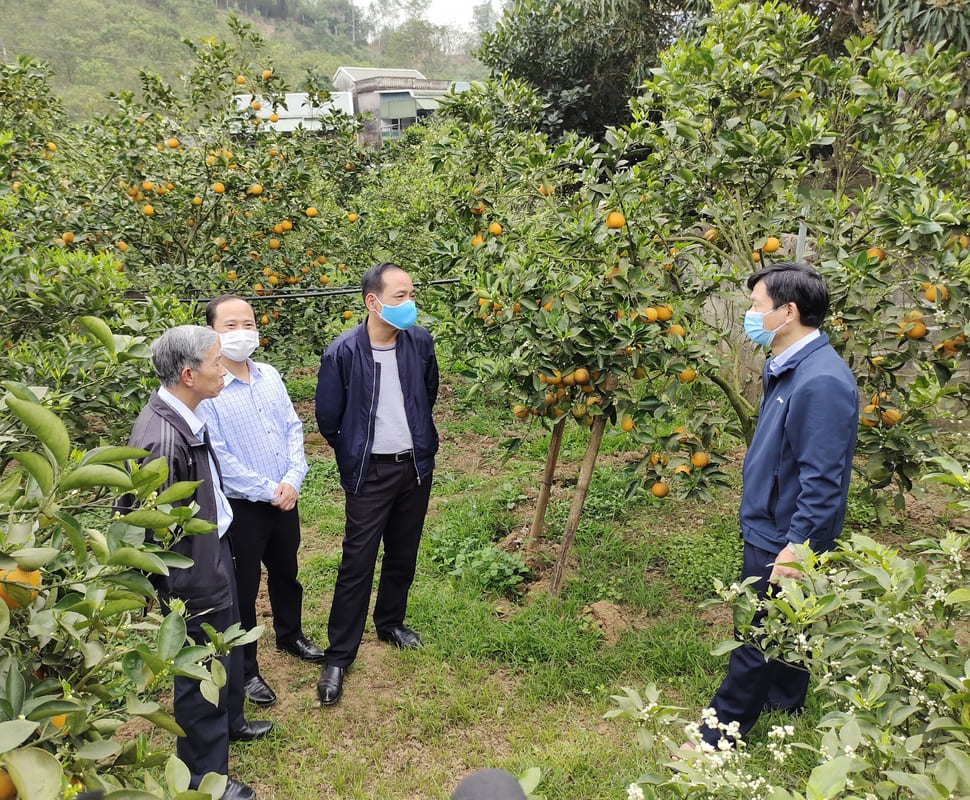
(HBO) - A delegation from the Department of Agriculture and Rural Development of Hoa Binh province paid a visit to Cao Phong district to check production of winter-spring crops here on February 22.
.jpg) The provincial Department of Agriculture
and Rural Development delegation examines a citrus farm in Bac Phong commune,
Cao Phong district.
The provincial Department of Agriculture
and Rural Development delegation examines a citrus farm in Bac Phong commune,
Cao Phong district.
According to the Cao Phong People’s Committee, the district plans to cultivate
a total of 4,527 hectares of winter-spring crops, including 1,289 hectares of
grains (530 hectares of rice and 750 hectares of maze), and 83 hectares of
short-term industrial crops.
The district will also convert about 300 hectares of oranges and tangerines
with low yield to farm other crops, such as maze, sugarcane and banana, to
improve soil quality.
So far, Cao Phong has planted around 40 percent of rice areas while preparing
soil for other crops. It sets to completed seedlings for the spring crops
before March 15.
After and before Tet (Lunar New Year) holiday, the district reported stable
animal farming without outbreaks of diseases found. The total number of cattle
and poultry heads in the district is estimated at 287,000, including 7,900
buffaloes, 1,700 cows, and more than 15,000 pigs.
The district has 113 irrigation works. Water levels of many local reservoirs
are falling as farmers prepare soil for agricultural production. If it doesn’t
rain soon, there is likely water shortage for rice farming in the coming time.
Visiting the communes of Nam Phong, Hop Phong, Dung Phong and Bac Phong, the
delegation suggested Cao Phong tell farmers to stop cultivating rice in areas
planned for other crops to prevent water shortage. The district was also asked
the district to continue shifting from low-yield to high-yield crops and expand
sugarcane production./.
According to data from the Hoa Binh Provincial Party Committee, the industrial production index for the first six months of 2025 is estimated to have increased by 20% compared to the same period last year. This marks the highest year-on-year growth rate for this period since 2020.
In the first six months of 2025, Hoa Binh province’s export turnover was estimated at 1.145 billion USD, marking an 18.11% increase compared to the same period in 2024. Import turnover was estimated at $ 804 million, a 17.15% increase, which helped the province maintain a positive trade balance.
The lives of the ethnic minority farmers in Tan Lac district have gradually improved thanks to the new directions in agricultural production. This is a testament to the collective strength fostered through the professional associations and groups implemented by various levels of the district’s Farmers’ Union.
With the motto the "product quality comes first,” after nearly one year of establishment and operation, Muong village’s Clean Food Agricultural and Commercial Cooperative, located in Cau Hamlet, Hung Son Commune (Kim Boi district), has launched reputable, high-quality agricultural products to the market that are well-received by consumers. The products such as Muong village’s pork sausage, salt-cured chicken, and salt-cured pork hocks have gradually carved out a place in the market and they are on the path to obtaining the OCOP certification.
In the past, the phrase "bumper harvest, rock-bottom prices" was a familiar refrain for Vietnamese farmers engaged in fragmented, small-scale agriculture. But today, a new spirit is emerging across rural areas of Hoa Binh province - one of collaboration, organisation, and collective economic models that provide a stable foundation for production.
Maintaining growing area codes and packing facility codes in accordance with regulations is a mandatory requirement for agricultural products to be eligible for export. Recently, the Department of Agriculture and Environment of Hoa Binh province has intensified technical supervision of designated farming areas and packing facilities to safeguard the "green passport" that enables its products to access international markets.



.jpg) The provincial Department of Agriculture
and Rural Development delegation examines a citrus farm in Bac Phong commune,
Cao Phong district.
The provincial Department of Agriculture
and Rural Development delegation examines a citrus farm in Bac Phong commune,
Cao Phong district.